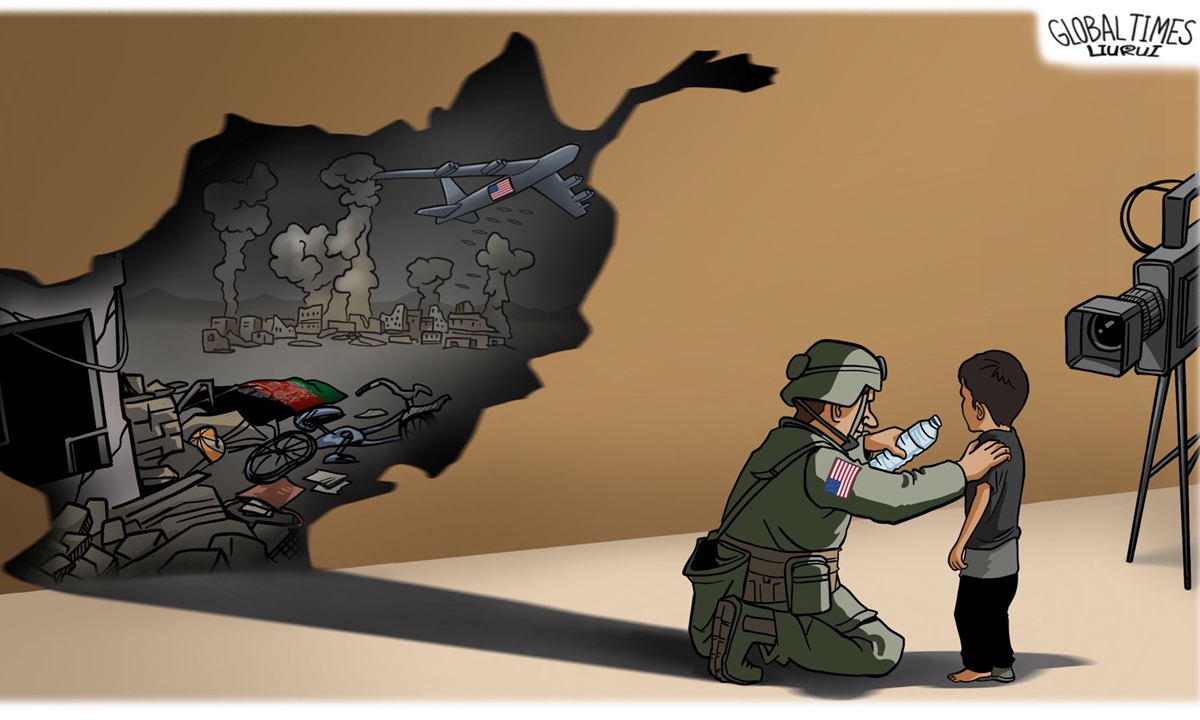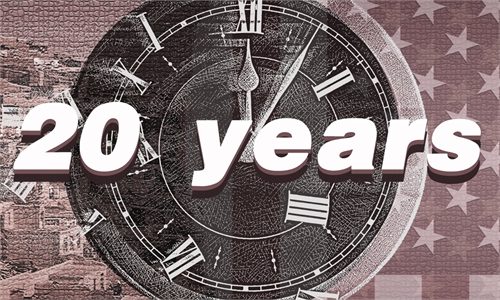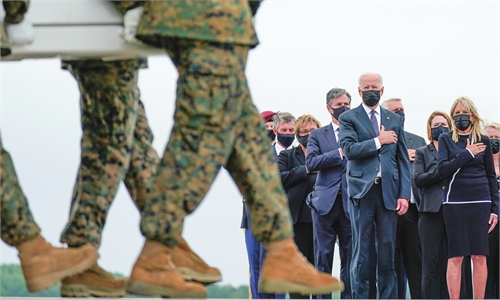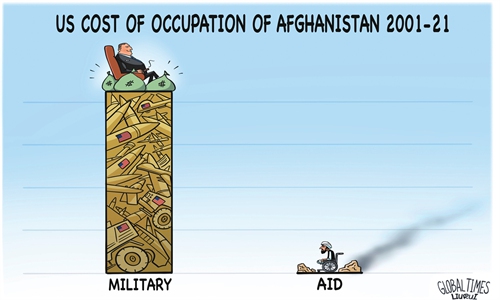
Illustration: Liu Rui/GT
Unlike other failed operations, the US war in Afghanistan is and will not be forgotten. It is being rewritten altogether so that it can be remembered as an epic with a "heroic" retreat.In the name of counter-terrorism, US forces invaded Afghanistan in 2001, with high hopes and wild fantasy that it could remake the Eurasian heartland to its liking, or "a democracy" by American standards.
The US administrations groomed an Afghan government and supported it with recognition and resources. But after 20 years, the American-style democracy didn't arrive with desired security and prosperity; in its place are violence, mass casualties and enduring pain. Images speak volumes. In a photo, Afghan refugee Sharbat Gula stared at the lens when every muscle around her piercing green eyes tensed up with fear and horror.
The war cost the US dearly and the country knows it well. "Was it worth the trillions spent?" asked a retired Navy SEAL and White House staffer for president Bush and Obama, who added that Osama bin Laden was probably laughing in his grave how much the US had spent in Afghanistan.
Did the 2,300 dead and 20,589 injured among the more than 775,000 US troops deployed to Afghanistan fight in vain? US officials interviewed by the Washington Post admitted that the warfighting strategies were fatally flawed, as the number of terrorist organizations surged from single digit to more than 20.
The war took innocent lives and tore families apart. In the country of about 38 million people, an estimation of 35,000 to 40,000 civilians died in the war according to a Brown University project and UN statistics. Just few days before the US withdrawal ended, the US air force killed at least 12 Afghan civilians including seven children in retaliation against ISIS suicide bombers.
The utter disgrace triggered "selective amnesia" among top US officials. President Joe Biden denied that the troops were deployed for nation-building. Many of the Afghan translators who worked for top US envoys were rejected from entering the US. US allies had their demands for a "conditions-based withdrawal" rejected by Biden and had no choice other than swallowing the consequences of the hasty retreat.
Rather than face up and admit the flaws, the US tries hard to expunge the memory of the war it started, and reshape the history through propaganda. From August 21, or 10 days before the set finale of US presence, the US Department of Defense and the Marine Corps started to tweet a gush of photos featuring US soldiers at the Kabul airport. The men and women in uniforms held Afghan babies close to their chests or chatted casually with local children. Some soldiers even knelt to the ground, feeding the underaged bottled water.
Through US media, many people learned the story of Sergeant Nicole Gee, a female Marine who made the ultimate sacrifice in the terrorist attack in late August. She appeared in a photo, dated to a week before her death, in which she cradled an Afghan baby at the Kabul airport. Portrayed so peaceful and caring, with a gentle smile on her face, the soldier almost seemed like a savior to the kid. But the reason the kid was taken from his own mother's embrace was the soldier, and the hundreds of thousands she represents, who had invaded the country, pulled triggers and had blood on their hands. Her death is tragic, so are the countless Afghan children.
Indeed, humanity highlighted in the "bonding" pictures is contrasted by cruelty outside them. It would be hardly surprising if the serviceman talking to local children were actually looking into an Afghan child's eyes for the first time. And the children that sipped the US bottled water may have been thirsty for days at the airport and cut off from humanitarian aid under US watch. To stage photos and praise the virtues of aggressors is the very opposite to humanity.
Similar scripts had been seen in other US battlegrounds: moments of feigned intimacy were repeated and prolonged until the whitewashed story takes hold of collective memory. But the "heroic" image the US filmed in Afghanistan is hypocritical. The background of the picture, including war flames, gun shots, rumbles and wreckages, was created by the US to flex its muscles. When there is no chance of winning, the US puts on a mask of tenderness and crowns itself with a sacred halo, to again make its intrusion a "just" endeavor.
If you read the stories really closely, you would find a footnote on every page that says, if it were not for the US trouble-making in the first place, there would be no such public stunt today.
The author is a commentator on international affairs who writes regularly for Global Times, CGTN and China Daily, etc.. He can be reached at xinping604@gmail.com.



